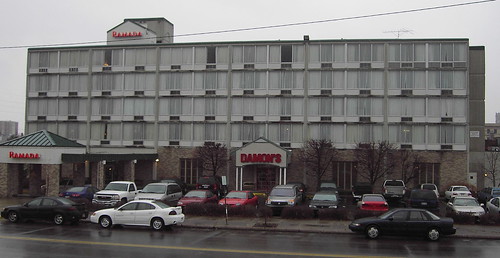
 Portsmouth Police chief Charles Horner has accused local websites of “crucifying” him and his family. What did this crucifixion consist of? John Welton had revealed that David Horner, the chief’s son, had a history of drug abuse, and that he had been arrested for selling drugs. The website’s publicizing of David Horner’s drug-dealing apparently felt to the chief like a crucifixion.
Portsmouth Police chief Charles Horner has accused local websites of “crucifying” him and his family. What did this crucifixion consist of? John Welton had revealed that David Horner, the chief’s son, had a history of drug abuse, and that he had been arrested for selling drugs. The website’s publicizing of David Horner’s drug-dealing apparently felt to the chief like a crucifixion.
Since I posted my last blog, I have learned from several sources that one of the places David Horner did his drug dealing was at Damon’s Restaurant, which is located in the Ramada Inn, directly across the street from the Portsmouth Police Station. Drug-related activities have reportedly been going on at the Ramada and at the restaurant, now operating as Damon’s, for a long time. That the Ramada is a reputed drug hangout triggered memories and prompted the following reflections:
When I came to Portsmouth fifteen years ago for a job interview, Shawnee State University reserved me a room at the Ramada. The culture shock I experienced in coming to Portsmouth reminded me of what I had experienced when I taught as a Fulbright exchange professor in communist Poland, in 1971-1972, and what I felt when I visited Third World countries in the 1973-1975, when, under the sponsorship of the U.S. State Dept., I was helping to organize international American Studies conferences to celebrate America’s bicentennial. Staying at Portsmouth’s Ramada Inn in 1989 was like staying at the best hotel in a provincial Polish city or at the “best” hotel in some poor Third World country in 1974.
I had grown up and gone to school in New England and had taught in California, but I had never been anywhere in the United States that was like Portsmouth, and I had never stayed at a hotel that was anything like the Portsmouth Ramada Inn, except in a Third World Country. The “best” hotel in a poor town attracts the worst, because it represents a degree of luxury or least an escape from poverty and depression. Pimps, prostitutes, drug-dealers – these are some of the unsavory characters who are attracted to the best hotel in a poor town, whether the hotel is in Africa, Poland, or southern Ohio.
If you try to learn about the Ramada by surfing the Internet, what you get is the folksy description that the Inn supplies to Yahoo, etc. “The Portsmouth Ramada Inn offers the old history and charm of a river city with all the comforts of a modern full service hotel.” That is what the Ramada says about itself. By contrast, what follows is part of a review by a guest at the Ramada. The title of the review, dated March 2005, is “Ramada Inn Portsmouth, Queen of the Rust Belt: Don't Drink the Coffee!”
“The Ramada Inn chain has recently fallen on hard times; nowadays their properties are restricted to dilapidating high-rises near city centers, buildings that just can't quite match the glitz of the newer chain motels out by the interstate. Well, Portsmouth, Ohio, doesn't even have an interstate, but you get the picture. In Portsmouth's case, the Ramada is a five-story 1960s-style building just a block off the Ohio River (and two blocks from the US 23 bridge that's been closed for two years and will be for three more). The building and its large, free parking lot are sandwiched between a discount medical supply emporium and a convenience store that, on Sunday nights, apparently sells more Bud Light (by volume) than gasoline. Inside, the Ramada has a noticeable case of the shabbies. It’s not dirty, mind you, just rather shopworn. Carpets are threadbare and loose in the corners, elevator buttons have long since lost their paint, metal surfaces are dented, and paint is scratched and chipped. Take the elevator to your fourth-floor room, and the theme continues.” This is pretty much the way the Ramada appeared to me, fifteen years ago, not decrepit but shabby.
Sometimes people who have not lived outside of southern Ohio ask me, “Are other towns like Portsmouth?” My short answer is “No,” because there’s something unique about Portsmouth, and the uniqueness is not simply a matter of space but also of time. Not only did coming to Portsmouth feel like being in a Third World Country, it also felt like being back in the 1940s, perhaps because that was when Portsmouth, as a healthy, self-sufficient city, began slowly dying. The sense that Portsmouth is in a time-bubble, or is like an insect preserved in amber, remains with me to this day.
In my first few years in Portsmouth, certain statistics struck me. For example, I heard the pregnancy rate among teen-age white girls in this region of the country was off the charts. And the largest cash crop in a fifty-mile radius of Portsmouth was marijuana. Somebody gave me a photocopy of a column that made the claim that the Appalachian white males felt like the most discriminated-against ethnic minority in America. It was always open-season on rednecks. It was if the youth of this dying city could find nothing better to do than smoke dope, produce babies out of wedlock, and complain about being a crucified minority. And that was before things got really bad.
The Ramada Inn was not doing so hot either. I’ve been told it has been on the verge of bankruptcy for much of its existence. The expansion of the university, a publicly funded enterprise, provided financial relief, not only by sending visitors to the university there but also in providing students to live in rooms that would otherwise remain unoccupied.

Queen of Rust Belt: Drug deals across from police station?
I was president of the union at Shawnee State U. during some politically tense times. The university was helping keep Ramda from going under financially, and they were grateful. I recall trying to contact members of an accrediting team who were visiting Shawnee during the controversial administration of Clive Veri. The visiting accrediting team was staying at the Ramada, but the suspicious management would not allow me to contact them. Whether or not they knew who I was, and I doubt they did, they knew Veri would like to insulate them from his many critics. I was reminded Portsmouth was not so different from communist Poland.
Here’s a curious thing. Mayor Kalb has said publicly that somebody is interested in the land on which the Municipal Building is located, which is the building athe police department is located in. There is a rumor that the party interested in acquiring the land is the owner of the Ramada, and that he wants the land to build another hotel. In other words, across the street from the site where the Ramada Inn has been unable to make a go of it from time immemorial without leeching on to a publicly funded institution, Shawnee State, the owner of the “Queen of the Rustbelt” wants to build another hotel, no doubt with abatements and pork renderings up the wazoo.
Propinquity means nearness in terms of blood relations and nearness in terms of place and time. Iniquity means a wicked act or thing, like drug-dealing. When it comes to the Queen of the Rustbelt, the propinquity of the iniquity is too much, even for Portsmouth.
The relocation of the police station to the building formerly occupied by a cable company, and of the city government to the Marting building, will have at least this advantage: The police station and the city offices will no longer be located directly across the street from a favorite haunt of drug-dealers, and the addicted relatives of the police chief, the politicians, and the over-privileged of Portsmouth will be able to breathe, or snort, a little easier.

 Portsmouth Police chief Charles Horner has accused local websites of “crucifying” him and his family. What did this crucifixion consist of? John Welton had revealed that David Horner, the chief’s son, had a history of drug abuse, and that he had been arrested for selling drugs. The website’s publicizing of David Horner’s drug-dealing apparently felt to the chief like a crucifixion.
Portsmouth Police chief Charles Horner has accused local websites of “crucifying” him and his family. What did this crucifixion consist of? John Welton had revealed that David Horner, the chief’s son, had a history of drug abuse, and that he had been arrested for selling drugs. The website’s publicizing of David Horner’s drug-dealing apparently felt to the chief like a crucifixion. 